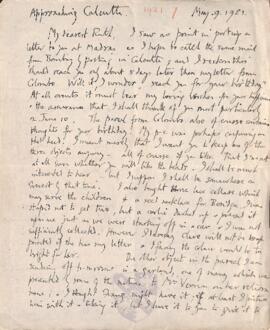Letter to Ruth Mallory, written on ‘Mount Everest Expedition’ Letterhead
Brief Summary
Responds to news in her letters. They had been in the same camp for two weeks. He had spent some of the time at the advanced camp climbing with Bullock. Snow had put an end to their climbs and Howard-Bury had ordered them to leave camp and return to the lower one. Bullock carried a pink umbrella on the marches. Didn't think much of Howard-Bury's official accounts of their climbs. Describes other members of the party and their physical fitmess. Was still hoping to attempt to summit but it would depend on the weather.
Detailed Summary
They had received two mail deliveries and everyone in camp spent a long time silently reading their letters. He responds to news in her letter mentioning Bob Morgan, photos of the children, the Keynes, O’Malley, the Fletchers, the Brocks, the Trews [?], and thanks her for being very diligent about circulating his news. He feared his letters had been very dull but had been writing partly for himself as a record which he otherwise wouldn't have made.
He had received a letter from Avie and David who had both enjoyed their visits to Ruth and he had enjoyed hearing about her from them. He had also heard from his mother and father who were very happy after visiting her. His father seemed to be greatly impressed by John [their son]. Mentions Miss Walround, Edith Stopford, the Reads, and that it was nice to hear that Geoffrey Young was anxious to hear his news. Was delighted by photos of the children. Asks in detail about the state of the garden, her upcoming plans, and whether she is going to Westbrook [Ruth's father’s house].
They were still in the same place as over a fortnight ago. Describes working on the upper camp (1st Advanced at 20,000 ft) with supplies, attempting to stay up there, trekking with Bullock and of pitching a tent in the usual snowstorm. Describes the fine granular snow of high altitudes. After a good night’s sleep he had woken to see the roof of his tent hanging inwards and a white world outside and conditions for climbing were entirely hopeless.
He had a Kodak camera to take snapshots of the porters and their snow-bound camp and a quarter-plate to take photos of the mountains. Spent the morning sitting on a rock taking six photographs before a porter arrived bearing a chit from Howard-Bury who had nothing more to say than to urge the obvious. After a debate with Bullock they had packed up the tents, covered the stores and prepared to go down to Howard-Bury’s camp. Bullock had a pink umbrella which he invariably carried on the march.
He had told her little of the movements of the others as he trusted she would have been informed by Howard-Bury’s articles. These were not very informative and he wasn't impressed by them.
They were all together for the first time since Kampa Dzong. Raeburn on his arrival was almost a broken and heart-breaking figure, and when Howard-Bury and Wollaston arrived on 6 September they sketched over some difficulties about stores and had settled down quite amicably. Wollaston was a rather solitary bird who was always jolly and friendly to talk with, but he had the impression that he was more tired of the expedition than the rest of them.
He was happy but thought the month was too late already for their great venture and they would have to face great cold. Feared his hopes and plans for seeing something of India on the way back wouldn't be possible.
The interest remained for him and he felt that when they returned to Darjeeling he wouldn’t leave without regret. He’d like to undertake a few other ascents, less ambitious but perhaps more delightful. He was looking forward to seeing her again.
Wheeler had been taking photographs and Morshead had been keeping him company. There was a shortage of tents due to Raeburn’s unexpected arrival, so Morshead had slept in the tent with Bullock and himself [Mallory]. It was a disorderly but happy arrangement. Wheeler came in to eat with them while the rest had their meals round a table in a pukka mess tent. There was plenty of talk and good cheer but he still thought Wheeler was not a fit man. He Morshead and Bullock made a good trio. Heron had arrived yesterday as cheerful and good natured as ever and he promised him a bit of rock from the summit of Everest.
17 September [letter continues] - the weather had changed and they had woken to find the sky clear and remaining clear. The day before he had enjoyed a good walk with Morshead and Bullock and were rewarded with a beautiful view of Everest. That day he, Morshead and Howard-Bury had ascended a snow peak on the boundary ridge and seen a glorious view. He could see Kangchenjunga [third highest mountain in the world] and all the higher mountains to the East. Makalu straight opposite across the valley was gigantic and Everest at the head of the valley was very fine too. The snow was not melting as it should; above 20,000 ft or so it was powdery under a thin crust and it was impossible to get along without snowshoes, and fears they’ll have to pack up at once if the snow didn't melt properly on the glacier. Morshead was going badly and he [Mallory] was feeling the height a good deal. Altogether his hopes were about zero.
He had been thinking about the children and asked her to kiss them and show them the lozenges below [see drawings at the bottom of the letter] which were meant for special birthday kisses. Tomorrow they were going up again so he was busy.
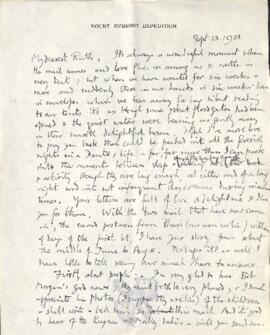

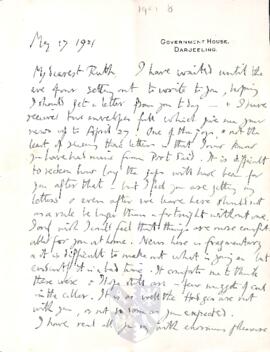
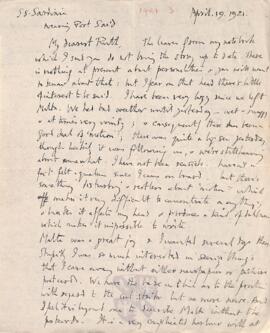
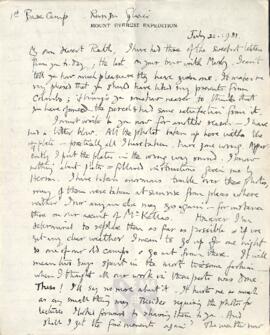
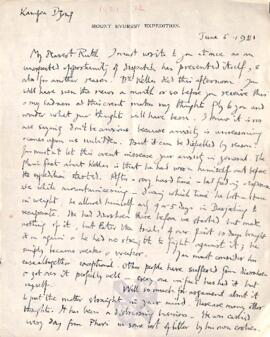
![Letter from George to Ruth Mallory, 8 June 1921 [first view of Mount Everest]](/uploads/r/null/b/0/8/b087a6ea8237585813251e913c908f81472ae581e133913d6193b97243ecb09c/PP_GM_3_1_1921_14_watermark_142.jpg)
